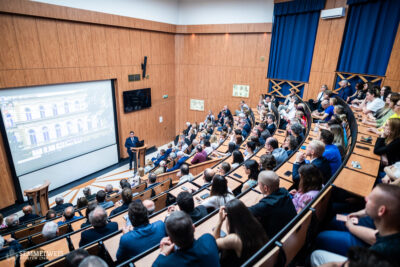“Semmelweis University is on the way of a paradigm shift”, Dr. Béla Merkely, President of the Clinical Centre summed up the most important message of the clinical forum.
As Dr. Merkely explained, in order to operate a full clinical portfolio successfully, the development of progressive health care and the establishment of a structured regional system are necessary.
 The forum on the Clinical Centre’s present and future was held by Dr. Béla Merkely, Vice-Rector for Clinical Affairs, Dr. Ágoston Szél, Rector, Dr. Károly Szász, Chancellor and Dr. Péter Cserháti, Ministerial Commissioner responsible for health care development in the Central Hungarian region. The event taking place in the Basic Medical Science Centre attracted much attention from the University’s students and employees.
The forum on the Clinical Centre’s present and future was held by Dr. Béla Merkely, Vice-Rector for Clinical Affairs, Dr. Ágoston Szél, Rector, Dr. Károly Szász, Chancellor and Dr. Péter Cserháti, Ministerial Commissioner responsible for health care development in the Central Hungarian region. The event taking place in the Basic Medical Science Centre attracted much attention from the University’s students and employees.
In his opening speech Dr. Ágoston Szél recalled that earlier, during his term as rector, he used to be the President of the Clinical Centre as well, but after the introduction of the Chancellery the idea of the system’s reorganisation arose. As a result, the responsibilities of the Rector, the Chancellor and the President of the Clinical Centre have been separated and have been operating accordingly ever since.
“The reorganisation was by all means useful, since the president of the centre is a competent clinician, has more insight in clinical affairs and takes responsibility for several difficult decisions. Together with Dr. Béla Merkely we strive to increase Semmelweis University’s prestige among the health care providers of Budapest in the coming years.”, Rector Szél said.
Dr. Béla Merkely held a presentation to doctors, health care professionals and medical students about the activities and future endeavours of the Clinical Centre.
 “The presidential members of the centre have been working together since last October. First of all, we assessed the position of the clinics and the health care situation of the Central Hungarian region, with a special focus on the current role and future opportunities of Semmelweis University. The university clinics in Szeged and Pécs have taken a step ahead of Semmelweis University, as they are the major providers in their own regions and have already merged with regional hospitals.”, said Dr. Merkely.
“The presidential members of the centre have been working together since last October. First of all, we assessed the position of the clinics and the health care situation of the Central Hungarian region, with a special focus on the current role and future opportunities of Semmelweis University. The university clinics in Szeged and Pécs have taken a step ahead of Semmelweis University, as they are the major providers in their own regions and have already merged with regional hospitals.”, said Dr. Merkely.
This process is already under way in Debrecen as well, where the concept of a university teaching hospital has appeared. Based on a survey Semmelweis University’s portfolio is incomplete and there would be a need for the realisation of a university teaching hospital function here as well.
One of the strengths of Semmelweis University is its position in the Central Hungarian region, which is one of the largest agglomeration. Here is a prominent centre for international education, there is a strong international research community, and a well-developed pharmaceutical industry, which Semmelweis University could use to develop its professional portfolio. However, the university’s weaknesses include the fragmented structure of the clinics, the old-fashioned infrastructure, the low quality of hoteling services, old buildings, a redundant system, the difficult mobilization of the university structure, and the time-consuming preparations for decision-making.
“The basis of the development of clinics is a unified system of university health care. There is no medical education without a strong background in practical training and a clinical network.”, said Dr. Merkely.
 Semmelweis University is the largest medical institution in Hungary, 6% of all health care activities take place here. All activities related to patient care should be present at the university ranging from practical courses to progressive health care of the highest level. The difficulties also justify the need for a paradigm shift: a structured regional system of health care should be created in order to operate the entire clinical portfolio successfully. Regarding this year’s budget, the opportunities of the clinics have been moderately improved, and the university has been provided with 500 million HUF by the Higher Education Structural Change Fund.
Semmelweis University is the largest medical institution in Hungary, 6% of all health care activities take place here. All activities related to patient care should be present at the university ranging from practical courses to progressive health care of the highest level. The difficulties also justify the need for a paradigm shift: a structured regional system of health care should be created in order to operate the entire clinical portfolio successfully. Regarding this year’s budget, the opportunities of the clinics have been moderately improved, and the university has been provided with 500 million HUF by the Higher Education Structural Change Fund.
There is a need for the increase of acute patient care, because those activities are not affected by a volume limit set by the National Health Insurance Fund of Hungary. Along with the realisation of greater capacity, it is also important to establish international specialized training centres at the clinics with a large patient turnover in order to participate in the international medical trainings within Hungary.
“The operation of a clinic should also be patient-friendly, supportive of the relatives, transparent and warm-hearted. It is not possible to provide good quality patient care where the employees are frustrated and the atmosphere is stern.”, said Dr. Merkely.
In order to meet the goals, it is inevitable to mobilize inner resources, to have a reasonable economic management, to optimize the structure, to open towards private financing, to increase the number of international graduate and post-graduate students as well as that of clinical trials and to increase the university’s role in the health care industry by founding spin off companies.
 The planned changes could result in making doctors and health care professionals stay in Hungary, increasing the number of residents and ensuring further training at the clinics for future doctors. In accordance with this endeavour a performance-based financial and ethical appreciation system should be set up at the clinics.
The planned changes could result in making doctors and health care professionals stay in Hungary, increasing the number of residents and ensuring further training at the clinics for future doctors. In accordance with this endeavour a performance-based financial and ethical appreciation system should be set up at the clinics.
The President of the Clinical Centre talked about the changes that have occurred since last October, such as the clinical centralizations enabling a more economical and more efficient operation, the founding of an independent Oncological Centre and the installation of a PET-CT. Dr Merkely announced that the university will probably have a new PET-CT by the end of the year.
During the forum the long term plans were also mentioned. The university would establish a campus in Buda with governmental support, which would increase the educational capacity. New blocks would emerge within the structure of Szent János Kórház in order to balance the inequalities in the capital city’s patient care, where Semmelweis University would place its entire capacity of paediatrics.
Afterwards Dr. Péter Cserháti held a lecture about health care related developments and transformations in the Central Hungarian region in the past years, and welcomed the changes the university has started to make since last year.
The Ministerial Commissioner and the leaders of the university held a question and answer session at the end of the forum.
Szilvia Tóth-Szabó
Photo: Attila Kovács
Translation: Ágnes Raubinek


